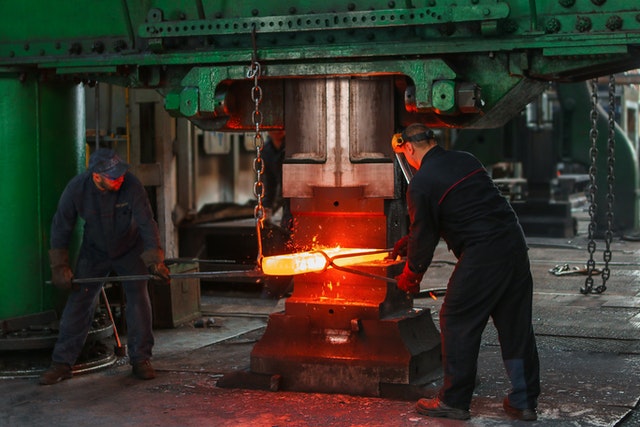Do you want to work with your hands? Are you tired of being stuck behind a desk? Then Basic Industries might be the perfect job for you.
In this blog post, we will go over everything you need to know about Basic Industries, including how to get started, what kind of jobs you can apply for, and how much you can expect to earn.
TL;DR: Is Basic Industries A Good Career Path?
There are several reasons for which a career in basic industries may be considered a good career path. Aside from several other reasons, this career path would provide stability in the long run.
According to the U. S. Department of Agriculture, there were 19.7 million full- and part-time jobs related to the agricultural and foods sectors in 2020 i. e. 10.3% of total U.S employment.
According to the report, 651,000 people depend on the mining industry in the United States, and 8 million jobs, equivalent to 9.5 percent of total U.S employment. There is an ever-growing demand for skilled employees in this field, so basic industries are a good choice for a career path.
Another factor working in your favor is that here you’re able to get a high-paying job. These industries directly affect people’s everyday lives.
There are numerous job options depending on the interest of the person applying. Besides that, the people who are employed in basic industries get to experience different situations. Because they’re constantly exposed to new things, their expertise level remains high.
This may be appealing to applicants who want a job where they’re challenged every day. Demand for raw materials never goes away. Hence the scope of the job will always be increasing.
Though here we’d like to say that the job in basic industries isn’t easy. They involve physical activity and are strenuous. However, they’re a good choice for those looking for something steady. There are so many jobs available that your job is safe from downsizing.
What Are Basic Industries?
Basic industries include those that provide raw materials for other industries to manufacture goods, such as mining, agriculture, hunting, fishing, and forest products. Further, these key industries perform the discovery, development, production, and processing of raw materials.
Furthermore, industries related to mining non-metallic mineral resources such as granite and marble fall under this umbrella. In addition, there are also industries involved in the extraction of metallic minerals, such as coal, copper, gold, iron ore, lead, silver, tin, zinc, and uranium.
What Are The Types Of Basic Industries?
Agriculture Industry
Agriculture is one of the most important industries in the world because of the number of jobs it provides and the number of people it impacts directly and indirectly. Agriculture is the dominant industry in both underdeveloped and developing economies, and it’s growing rapidly.
Agriculture is the primary source of raw materials for everything we eat. It is also the primary driver of our nation’s food supply. Furthermore, there is a close relationship between agriculture and the economic situation of a country.
Agricultural products account for a significant proportion of a country’s domestic consumption imports or exports.
Oil and Gas Industry
Oil and gas are one of the largest industries globally, and this industry consists of three main segments: upstream companies (oil), midstream companies (gas), and downstream companies (refining).
Oil companies focus on discovering and extracting oil from underground reservoirs, and oil pipelines transport oil from wells to refineries. Refineries refine crude oil into gasoline, diesel fuel, jet fuel, and other petroleum industry products.
Midstream companies focus on transporting oil by pipeline and ship. Downstream companies deal with refining and marketing petroleum industry products.
Downstream businesses are refineries that remove the contaminants from crude oil. As a result, this oil is used to produce products for general use, including gasoline.
Mining Industry
Minerals are an essential part of major industries, so mining is an important activity that takes place all over the world.
There are two main stages in the mining industry. The first stage is exploration, which involves searching for new deposits of minerals. The first step is to explore and determine whether there are any minerals at all.
Finally, there is a construction and planning phase. Mine plans are refined by obtaining permits.
Resources are the main assets in the mining industry.
Paper Industry and Pulp Industry
Contrary to popular belief among environmentalists, the paper and pulp industries continue to grow and thrive. There are a couple of firms that specialize in different segments, such as packaging and tissue products, and pulp is also used for textiles.
It also produces graphic papers that can be used in newspapers.
Steel Industry
Steel has been an essential part of the progress of the world for thousands of years. The role of this type of material in the construction of buildings, ships, and so on is clear, and there will always be a demand for steel.
It is undoubtedly an important basic industry. Steel is an alloy made from iron and carbon, and the production of steel is a highly specialized process performed in steel mills.
Various projects primarily use steel for construction. These include pipelines, railroad rails, and steel beams.
Chemical Industry
This industry is responsible for the transformation of raw materials (such as coal) into gases or chemical solutions (like hydrogen). These chemicals are used in other industries.
Basic chemicals include things like water, salt, and sugar. Specialty chemicals include things like detergents, solvents, and adhesives. Consumer chemicals include things like shampoo and toothpaste.
Furthermore, basic chemicals include other subcategories such as petrochemicals, plastics, and inorganic compounds.
Specialty Chemicals: This category includes dyes, paints, and chemicals used for crop protection, such as pesticides. These chemicals require a lot of research and development, so household paints and printer ink (among others) are examples of specialty chemicals.
Consumer Chemicals: They’re chemicals used every day. These consumer chemicals are readily available for sale to the public. Detergents, soap, and bleach are just a few examples of consumer products.
Textile production
Textiles involve converting raw materials such as cotton, silks, linens, and other fibers into threads or yarns, which are then used to produce fabrics. These jobs are located at textile mills and provide products to consumers for all sorts of household goods, including clothing, upholstery, carpeting, flooring, curtains, towels and bedding, furniture, automotive upholstery, cords and twines, industrial belts, and water hoses.
There are some well-paying basic industry textile jobs in the textile sector:
- Weaver
- Textile technician
- Textile designer
- Textile converter
- Print Manager
- Machine operator (trade career)
- Illustrator
- Engraver (trade career)
The construction industry in the United States
The construction industry is a major sector of the U.S. economy, employing more than 15 million people and contributing $1 trillion to the nation’s gross domestic product (GDP) annually. The industry has been growing steadily since the early 1990s. In 2014, it was estimated by the Bureau of Labor Statistics that there were 7,829,000 workers employed in the construction industry. Of these, 6,948,000 worked in private nonfarm establishments, 1,077,000 worked in government, and 8,099,000 worked in self-employed businesses.
Construction is defined broadly to include any activity related to building, maintaining, repairing, renovating, remodeling, demolishing, altering, adding to, subtracting from, moving, removing, reinstalling, or replacing structures or their components.
Construction work can be divided into two broad categories: commercial and residential. Commercial buildings include office towers, apartment complexes, shopping malls, warehouses, schools, hospitals, hotels, casinos, and sports arenas. Residential buildings include single-family homes, apartments, condominiums, townhouses, and mobile homes. Other types of construction projects include bridges, roads, tunnels, dams, levees, and wastewater treatment plants.
What Are The Characteristics Of Basic Industries?
There are some general characteristics that apply to all basic industries. We’ll go through them one by one below.
Highly Trained Personnel
Basic industry workers are often exposed to high-risk conditions. Therefore, firms must hire only highly qualified and trained employees to improve efficiency and reduce their chances of mishaps.
Physical Nature of Work
A job in a basic industry requires someone to be out and about; any role would involve a lot of running around; standing; lifting weights; bending, or stretching yourself. They’re not sitting around doing anything. Hence, people looking to get into the workforce should avoid basic industries.
Impact on the Environment
Basic industries produce a lot of waste products that tend to harm the environment. Besides polluting the environment, these industries are hazardous to the workers and the people living nearby.
How Many Jobs Available In Basic Industries?
Bureau of labor statistics says that there were 22,262.91 openings in basic industries (including mining, construction, manufacturing, agriculture, forestry, fishing, and hunting), 12.41% more than in 2010, and it’s expected to go up 2.71% by 2030.
Is Basic Industries A Good Career Path Characteristics Of The Employees?
Finally, it’s time to scrutinize the characteristics of the ideal employees who would work in basic industries.
Adaptability
Macroeconomic factors have the greatest impact on basic industries. Therefore people need to adapt to change while working in basic industries, and they also need to keep up with technological developments.
Productivity
Firms look for employees who are good at managing their time effectively. People should engage in activities that add value to their organizations, whether working for an online retailer or a local restaurant.
Attitude
A positive approach helps you deal with the ups and down in basic industries. Workers should continuously improve their skills and abilities while they’re working, which will help them in the long run.
Teamwork
Working collaboratively with others is an important skill for success in the workplace. You should learn to coordinate and collaborate with multi-disciplinary teams. This helps everyone involved as they’re aware of the bigger picture, and the different moving parts, too.
Communications skills
To start a career in the basic industries sector, you need to have excellent communication skills in addition to practical, on-the-job knowledge.
Time management & Multi-tasking
Time management and multitasking are key to success in this industry. Companies seek employees who are amazing at time management.
Salary in Basic Industries
In most cases, the annual salary for a basic industry career will depend on the expertise and skills of the individual. But, some entry-level positions may offer lower salaries. Salaries in this field can range from $21,000 to $51,000 per year, with some earning much more than that.
The Bureau of Labor Statistics (BLS) projects that the basic industries sector will go up by about 5.2 percent between 2016 and 2026, which should provide plenty of excellent employment opportunities for those looking to enter the field.
Education in Basic Industries
Basic industries careers often require a formal education such as a degree in engineering or a highly technological degree. But there are many jobs that do not require past formal education. It is essential to research the specific industry you are interested in before applying for a job, but overall there are minimal education requirements in most basic industries.
What Is The Future of Basic Industries?
If you plan to develop your career in a basic industry, it’s essential to consider its future. Some regulations are being tightened. Industries that use a large number of resources, like mining or logging, are likely to disappear in the near future. Governments are starting to value the importance of sustainability and want to ensure that all industries are environmentally responsible.
It doesn’t mean that all industries will be wiped out. Basic industries, like agriculture and manufacturing, are likely going to continue to exist for some time because they don’t utilize many resources. They’re also more adaptable than other sectors, so they can adjust to changing economic conditions.
There are many different kinds of basic industries that will be able to survive for the foreseeable future. Agriculture is an important industry, as is manufacturing. It’s essential to remember that not every industry needs to be large and commercialized in order for it to be successful. There are many small business owners who produce high-quality finished products and services without sacrificing their employees’ health and safety.
It’s safe to assume that there will be more innovations in the basic industries in the future. We will see new finished products and processes, so companies who invest in these industries will be able to stay one step ahead of their competitors.
Basic industries pros and cons
With regards to careers in this field, there are some pros as well as cons.
Education
Many careers in this field can be considered trade jobs, but not all. Many of these jobs don’t require any formal education, but some may require just a high school diploma or an equivalent.
Security
As a rule of thumb, jobs in the basic industries offer more security than many other options because the products they produce will always be needed. Many of these companies continue to test and manufacture new products, which keep the excellent opportunities alive and thriving.
Pay + Benefits
Many jobs in the industry are high-paying jobs with great benefits because they’re usually in large international companies. Some of the highest-paying jobs in the basic industries include:
• Chemical engineer
• Engineers
• Industrial engineers
• Manufacturing managers
• Mechanical engineers
• Metallurgists
• Mining engineers
• Petroleum engineers
• Process engineers
• Research scientists
• Safety professionals
• Technical writers
•Energy engineer
Economics
Like with any other industry, the business sector can be affected by bad economic times. They may be less likely to experience disruptions in their workforce than other industries, but they’re not immune to them either. Because much of the goods produced in this sector for homes would have been affected by the financial crisis of 2008, it would have had an effect on the economy.
What companies are in the basic industries field?
There are so many companies in the basic industry sector it would be almost impossible to list them all. But, to give you an idea of the kinds of brands that offer job opportunities in this sector, we have included a list of companies below.
Cargill.
A company that is well known for its agricultural and food products and has a presence across more than 65 countries.
Chevron.
Chevron is one of the largest employers in the gas industry. They offer a lot of opportunities for job seekers.
Dow Chemical.
A company that produces a variety of raw materials for use in many industries. They have a global presence, so there are plenty of opportunities for job seekers from all over the world.
DuPont de Nemours.
A major player in multiple industries, DuPont provides various raw materials to manufacturers. They produce materials for the automotive industry, industrial sector, consumer products, and the electrical component industry.
Glencore International.
An industry leader in producing metals and minerals, energy, and agricultural products. They are worldwide and provide a lot of opportunities for people looking for new jobs.
International Paper.
A company that focuses on pulp production and paper production. It is a global leader in its field. They produce products that are used every day in our lives, such items as paper towels, tissues, and diapers. They offer a large range of job opportunities from forklift operators and electricians to plumbers and provide a great benefits package.
Basic Industries Career Path Examples
Some interesting basic industries jobs include:
Petroleum geologists
A petroleum geologist is an expert in the oil industry and gas exploration. They are trained to find, evaluate, and interpret subsurface geological data that can be used to predict where oil or natural gas may exist.
Safety officer
Safety officers are responsible for overseeing training methods and practices for workplace safety at each location and documenting work-related accidents and injuries.
Conservation Scientist
A conservation scientist (or ecologist) is someone who studies the interactions between people and nature. They are often called “conservation scientists” because they study how to conserve species, habitats, ecosystems, and landscapes for future generations. Conservationists also study how humans affect wildlife and natural environments.
Forensic scientists
Forensic science is the study of crime and its detection. It includes many different fields, such as chemistry, biology, physics, engineering, medicine, psychology, sociology, anthropology, law enforcement, forensics, criminology, etc.
Animal scientist
An animal scientist is a scientist who studies the biology, behavior, and ecology of animals. The term has been used since at least 1891 to describe scientists who study animals in their natural habitats (zoology), but it was not until the late 20th century that zoologists began using the term “animal scientist” to describe themselves.
Materials Scientist
A material scientist is a person who works with materials, including plastics, ceramics, glass, and metal. Materials scientists develop new materials, improve existing ones, and test them for quality control.
Drilling engineers
A drilling engineer is a person who designs and builds equipment used to drill for oil, gas, or other minerals. They work with geologists, chemists, physicists, and mathematicians to develop and engineer new drilling techniques and technologies that help extract more oil from existing wells.
Frequently Asked Questions
What are the job opportunities in the basic industries?
The basic industries jobs include agriculture, mining, manufacturing, construction, utilities, transportation, and wholesale trade. These industries employ more than half of all workers in the United States.
Which basic industry gives the most employment?
The basic industry that provides the most jobs is manufacturing. The second-largest job provider is Retail Trade.
What would be an example of a non-basic industry?
An example of a non-basic industry would be the legal profession. The reason is that although there are some basic skills needed to get started, there are so many different areas of law that require specialist knowledge.
Why is the iron and steel industry called the basic industry?
The iron and steel industry has been around since ancient times. The first metal was discovered in China over 4,000 years ago. Iron was used for weapons, tools, and other items, and today it is used for a variety of building and real estate projects, including railroad tracks.
Which basic industry has a great future?
The basic industry with the greatest potential for growth is the food industry. The global population will increase from 7 billion people today to 9 billion people by 2050.
What is the easiest basic industry to get a job in?
The easiest basic industry job to get jobs in is Retail. The reason is that there are so many people looking for work in this field.
Which basic industry will grow in the next 10 years?
The basic industry that will grow in the next decade is the healthcare sector. The number of people living longer than ever before means there will be more people needing medical care.
Statistics
- The bureau of labor statistics says that there were 22,262.91 jobs in basic industries (including mining, construction, manufacturing, agriculture, forestry, fishing, and hunting), 12.39% more than in 2010, and it’s expected to go up 2.7% by 2030.
- The Bureau of Labor Statistics (BLS) projects that the basic industries sector will grow by about 5 percent between 2016 and 2026, which should provide plenty of opportunities for those looking to enter the field.
- According to the U.S. Department of Agriculture, 19.7 Million full- and part-time jobs were related to the agricultural industry and food sectors in 2020.
- 5.6% of total U.S. employment depends on the Oil and Gas Industry.
- An estimated 601,149 Americans are reliant on the mining industry involves, which employs 8 million people, or 9.6 percent of the total U.S. workforce. (energy.gov)
Conclusion And Final Thoughts
In conclusion, basic industries are a great and solid career path if you have a passion for helping others. There’s nothing better than being able to provide for someone else, and basic industries allow you to do exactly that. Plus, you’ll always have a job when the economy turns around.




